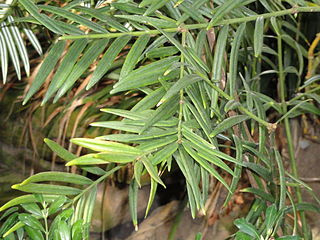
The Torrey pine is a rare pine species in California, United States. It is a critically endangered species growing only in coastal San Diego County, and on Santa Rosa Island, offshore from Santa Barbara in Santa Barbara County. The Torrey pine is endemic to the California coastal sage and chaparral ecoregion.

The spotted nutcracker, Eurasian nutcracker, or simply nutcracker is a passerine bird slightly larger than the Eurasian jay. It has a much larger bill and a slimmer looking head without any crest. The feathering over its body is predominantly chocolate brown with distinct white spots and streaks. The wings and upper tail are virtually black with a greenish-blue gloss.

Pinus resinosa, known as red pine, is a pine native to North America.

Pinus wallichiana is a coniferous evergreen tree native to the Himalaya, Karakoram and Hindu Kush mountains, from eastern Afghanistan east across northern Pakistan and north west India to Yunnan in southwest China. It grows in mountain valleys at altitudes of 1800–4300 m, reaching 30–50 m (98–164 ft) in height. It favours a temperate climate with dry winters and wet summers. In Pashto, it is known as Nishtar.

Pinus bhutanica, which may be called the Bhutan white pine, is a tree restricted to Bhutan and adjacent parts of northeast India and southwest China. Along with the related Pinus wallichiana it is a constituent of lower altitude blue pine forests. This pine reaches a height of 25 meters. Note that P. wallichiana is sometimes called by the common name 'Bhutan pine'.

Pinus arizonica, commonly known as the Arizona pine, is a medium-sized pine in northern Mexico, southeast Arizona, southwest New Mexico, and western Texas in the United States. It is a tree growing to 25–35 m tall, with a trunk diameter of up 1.2 m. The needles are in bundles of 3, 4, or 5, with 5-needle fascicles being the most prevalent. This variability may be a sign of hybridization with the closely related ponderosa pine. The cones are single, paired, or in whorls of three, and 5–11 cm long.

Pinus sibirica, or Siberian pine, in the family Pinaceae is a species of pine tree that occurs in Siberia from 58°E in the Ural Mountains east to 126°E in the Stanovoy Range in southern Sakha Republic, and from Igarka at 68°N in the lower Yenisei valley, south to 45°N in central Mongolia.

Pinus tabuliformis, also called Manchurian red pine, Southern Chinese pine or Chinese red pine, is a pine native to northern China and northern Korea.

Pinus cembroides, also known as pinyon pine, Mexican pinyon, Mexican nut pine, and Mexican stone pine, is a pine in the pinyon pine group, native to western North America. It grows in areas with low levels of rainfall and its range extends southwards from Arizona, Texas and New Mexico in the United States into Mexico. It typically grows at altitudes between 1,600 and 2,400 metres. It is a small pine growing to about 20 m (66 ft) with a trunk diameter of up to 50 cm (20 in). The seeds are large and form part of the diet of the Mexican jay and Abert's squirrel. They are also collected for human consumption, being the most widely used pine nut in Mexico. This is a common pine with a wide range and the International Union for Conservation of Nature has rated its conservation status as being of "least concern".

Pinus armandii, the Armand pine or Chinese white pine, is a species of pine native to China, occurring from southern Shanxi west to southern Gansu and south to Yunnan, with outlying populations in Anhui. It grows at altitudes of 2200–3000 m in Taiwan, and it also extends a short distance into northern Burma. In Chinese it is known as "Mount Hua pine" (华山松).
Pinus squamata, the Qiaojia pine or southern lacebark pine, is a critically endangered pine native to a single locality consisting of about 20 trees in Qiaojia County, northeast Yunnan, China, at about 2,200 m (7,200 ft) elevation.

Pinus massoniana is a species of pine, native to Taiwan, a wide area of central and southern China, and northern Vietnam.
Amanita parvipantherina, also known as the Asian small panther amanita, is a species of agaric restricted to Yunnan province in China. It is strongly associated with the Yunnan Pine Pinus yunnanensis. It fruits in July and August.

Amentotaxus yunnanensis, the Yunnan catkin yew, is a species of conifer in the yew family, Taxaceae. It is native to Laos, Vietnam, and Guizhou and Yunnan in China.

Cupressus duclouxiana, known commonly as the Chinese cypress or Yunnan cypress, is a species of conifer in the cypress family, Cupressaceae. It is endemic to China, where it is known from Yunnan and Sichuan. It grows in deep river gorges. Its habitat is mountain forest where it occurs alongside the Sikang pine and various oaks, chinquapins, and chestnuts.

Pinus wangii, commonly known as the Guangdong white pine, is a species of conifer in the family Pinaceae.

The Yunnan nuthatch is a bird species in the nuthatch family Sittidae. It was first described by William Robert Ogilvie-Grant in 1900 based on a male holotype. It is a small nuthatch, measuring 12 centimetres (4.7 in) in length on average and weighs between 7.5 and 13 grams. The grey-blue upperparts contrast with the light, smooth, buffy lowerparts. It has a fine white eyebrow above a black eyestripe, which is distinct when the plumage is fresh, and exhibits a small degree of sexual dimorphism. A noisy bird, it produces simple, nasal sounds, sometimes in repetitive series.

The Yunnan box turtle is a species of turtle in the family Geoemydidae. It is believed to be endemic to Yunnan, China and was suspected to be extinct since the early 20th century; the last verified specimen was collected in 1940.

Tomicus piniperda, the common pine shoot beetle, is a bark beetle native throughout Europe, northwestern Africa, and northern Asia. It is one of the most destructive shoot-feeding species in northern Europe.
Butyriboletus sanicibus is a pored mushroom in the genus Butyriboletus. Found in China where it grows in association with Yunnan pine, it was described as a new species in 2014.



















